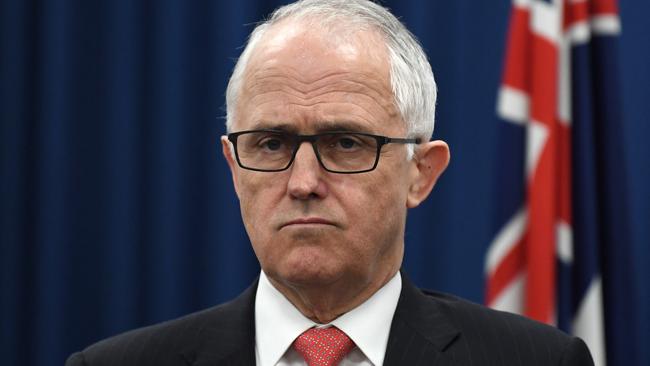Turnbull plans law to force tech giants to decrypt messages
THE government is taking on the tech giants over encryption. But the response the announcement has been far from positive.

A PROPOSED new cybersecurity law that forces global technology companies such as Facebook and Google to help police by unscrambling encrypted messages sent by suspected extremists and other criminals has been announced by the Federal Government.
The new law would be modelled on Britain’s Investigatory Powers Act, which was passed by the British Parliament in November and gave intelligence agencies some of the most extensive surveillance powers in the Western world, Prime Minister Malcolm Turnbull said.
The bill that would allow courts to order tech companies to quickly unlock communications will be introduced to Parliament by November, Attorney-General Sentaor George Brandis said.
Mr Turnbull said under the law internet companies would have the same obligations telephone companies do to help law enforcement agencies. Law enforcement agencies would need warrants to access the communications.
“We’ve got a real problem in that the law enforcement agencies are increasingly unable to find out what terrorists and drug traffickers and paedophile rings are up to because of the very high levels of encryption,” Mr Turnbull said.
“Where we can compel it, we will, but we will need the co-operation from the tech companies,” he added.
But the response to this morning’s announcement — which was very light on detail — was far from positive.
Government wants to be seen to be doing ~something~. Actual detail to be worked out at a later date.
— Josh Taylor (@joshgnosis) July 14, 2017
It’s very clear here that the “laws†contain no specifics… they’re asking Apple-Facebook to come up with a way to break encryption. https://t.co/cyZ9S7l78L
— Mark Di Stefano 🤙🻠(@MarkDiStef) July 14, 2017
There is no way to create #encryption backdoors for law enforcement that wouldn't make systems more vulnerable to hacking. #infosec #privacy
— Liam Pomfret (@LiamPomfret) July 14, 2017
The entire political debate around #Encryption is made by people with no knowledge or experience, and assume that nerds can do anything.
— Michael Keating (@D_Keating) July 14, 2017
Nobody has yet explained what 'targeted lawful access' looks like in practice. Hard to imagine how that doesn't involve weakening security. https://t.co/M6WKe4DttW
— Simon Elvery (@drzax) July 14, 2017
Is it normal to feel more under threat from your own government than terrorism? #auspol #encryption
— George Nott (@georgepnott) July 14, 2017
If i were a betting man, I'd bet against Turnbull in this fight. https://t.co/CNmWkri8WM
— David Olsen (@DDsD) July 14, 2017
Encryption debate goes stupid
— 🔥High Quality Guy🔥 (@dobes) July 14, 2017
The laws of Australia will trump the laws of mathematics: Australian Prime Minister https://t.co/TFIT0GwGWz pic.twitter.com/8qU6F5ta1s
Great pic from @TurnbullMalcolm's encryption press conference today, as he tells the laws of mathematics they have no force in Australia pic.twitter.com/WdNhkUFPaR
— Bernard Keane (@BernardKeane) July 14, 2017
The government expected resistance from some tech companies, many of them based in the United States. But the companies “know morally they should” co-operate,” Mr Turnbull said.
“There is a culture, particularly in the United States, a very libertarian culture, which is quite anti-government in the tech sector,” Mr Turnbull said. “I’m not suggesting this ... is an easy nut to crack,” he added.
Facebook has already said it will resist the Turnbull government’s anti-encryption push.
Comments previously made by Apple CEO Tim Cook have steadfastly ruled out the potential of any co-operation with governments which would weaken the secuirty of its products.

Senator Brandis described the growth of encrypted communication applications such as WhatsApp, Signal, Facebook Messenger and iMessage as “potentially the greatest degradation of intelligence and law enforcement capability that we have seen in our lifetime”.
He said he met the British government’s chief cryptographer last week and believed it was technically possible to decode encrypted messages in a timeframe that police needed to act.
This could be achieved without so-called back doors — built-in weaknesses that allowed a tech company access to a communication but could also leave it vulnerable to hackers, Senator Brandis said.
Australian Federal Police Commissioner Mike Phelan said the proportion of communication traffic monitored by Australian police that was encrypted had grown from 3 per cent to more than 55 per cent in only a few years.
He said 65 per cent of organised crime investigations including terrorism and paedophile rings involved some kind of encryption.



